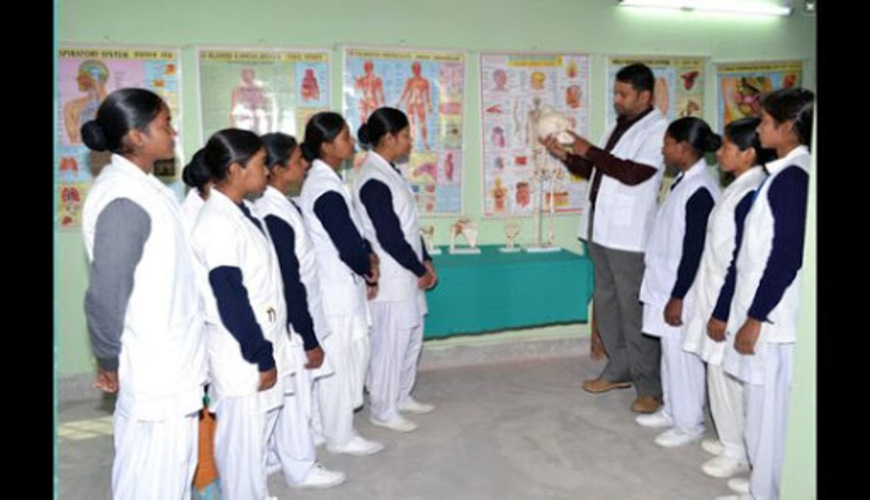
Certificate in Nursing Assistant (CNA)
By NCTA Team Last Updated: January 16, 2026Overview:
Certificate in Nursing Assistant (CNA) is a six-month program designed to equip aspiring healthcare professionals with the skills and knowledge necessary to provide essential nursing care. This course focuses on practical and theoretical training to prepare students for roles in hospitals, clinics, and other healthcare settings.
Students will learn about patient care, hygiene management, vital sign monitoring, administering basic medical assistance, and supporting healthcare teams in delivering quality care. The curriculum integrates modern healthcare practices with compassionate caregiving to ensure holistic patient well-being.
Upon completion, graduates will be well-prepared to work under licensed nurses and healthcare professionals, offering critical support in the fast-paced healthcare industry. This program is ideal for individuals passionate about healthcare and looking to begin a rewarding career as a Nursing Assistant.
Course Objectives:
To equip students with the essential skills and knowledge needed to provide compassionate, effective, and professional nursing care under the guidance of healthcare professionals.
Who is a Nursing Assistant?
A Nursing Assistant (CNA), also known as a Healthcare Assistant, or Patient Care Assistant, is a healthcare professional who provides essential support to registered nurses, doctors, and other medical staff in delivering patient care. They play a vital role in ensuring the comfort, safety, and well-being of patients in various healthcare settings, such as hospitals, clinics, nursing homes, and rehabilitation centers.
What Does a Nursing Assistant Do?
- Assists patients with bathing, dressing, grooming, and feeding.
- Monitors and records vital signs like blood pressure and temperature.
- Supports patients with mobility, walking, and physical exercises.
- Prepares patients and equipment for medical procedures.
- Maintains cleanliness and safety in patient areas.
- Provides emotional support and companionship to patients.
Course Curriculum:
Throughout the program, students will engage in a balanced mix of theoretical learning and hands-on training, focusing on patient hygiene, mobility assistance, vital sign monitoring, first aid, and emergency response. They will also develop interpersonal and communication skills to interact with patients, families, and healthcare teams. With a strong emphasis on professional ethics, safety, and legal aspects, graduates will be prepared to provide high-quality care in hospitals, clinics, nursing homes, and other healthcare settings. Below is the detailed curriculum:
- Foundations of Nursing
- Basic Nursing Skills
- Paediatric Nursing
- Nutrition in Nursing
- Pharmacological Aspects of Nursing Care
- Practical
Placement Areas:
Graduates will be well-prepared for a variety of career opportunities in the healthcare sector. The demand for qualified nursing care assistants is consistently high, and graduates can pursue careers in:
- Hospitals and Healthcare Institutions
- Nursing Homes and Rehabilitation Centers
- Private Clinics and Home Healthcare Services
- Palliative and Hospice Care
- Geriatric and Pediatric Care
- Medical and Health Organizations
Global Career Prospects:
Graduates of the Certificate in Nursing Assistant from National Council of Training Academy (NCTA) have the opportunity to work abroad, as NCTA’s certification is globally recognized and accepted. The skills learned in this program meet international healthcare standards, making graduates eligible for positions in countries with high demand for nursing care professionals.
NCTA is committed to helping its students achieve their career goals abroad. We offer guidance and support throughout the process, including assistance with work permits, visa applications, and finding suitable job opportunities in international healthcare settings. Whether you aim to work in Europe, the Middle East, or other regions, NCTA will assist in every possible way to ensure a smooth transition to a global career in nursing care.
Salary Expectations:
After completing Certificate in Nursing Assistant (CNA) in India, the expected salary ranges from ₹2 lakh to ₹5 lakh per annum. Entry-level positions typically offer around ₹15,000–₹25,000 per month, while experienced professionals can earn up to ₹40,000 per month. Salaries vary based on experience, employer type (hospitals, clinics, home care), and additional skills.
Global Salary Perspective:
- United States: Nursing Assistants earn an average of $30,000–$40,000 per year (~₹25–33 lakh).
- United Kingdom: The average salary ranges from £18,000–£25,000 per year (~₹19–26 lakh).
- Canada: CNAs typically earn between CAD 35,000–50,000 per year (~₹21–30 lakh).
- Australia: The average salary for CNAs is AUD 45,000–60,000 per year (~₹25–35 lakh).
- Middle East: Salaries vary widely, with CNAs earning ₹3 lakh–₹8 lakh per annum, depending on the country and employer.
Course Features
| Course Code | NCTA-150 |
| Duration | 6 MONTHS/ 270 HOURS |
| Category | Certificate in Nursing Assistant (CNA) |
| Eligibility | 10TH PASS/2-10 Year Experience in Relevant Field |
| Fees | INR(₹) 12000.00 / USD($) 210 |
To know more about our this course, feel free to call us at:
+91 9733600770Ready to Enroll in This Course?
Start your learning journey today and unlock your potential!
Apply Now for This CourseCurrent Job Opportunities for This Course
Dental Assistant (Clinical Assistant)
Rudra Dental Chennai (Anakaputhur)Prabhi Travels is hiring an International Travel Consultant in New Delhi (Janakpuri). The role involves selling international holiday packages, creating customized itineraries, handling travel inquiries, and ensuring excellent customer service. Attractive incentives and performance bonuses are offered.
Read MoreAssistant Professor in Medical & Surgical Nursing
Harsha Institutions Nelamangala, Bengaluru, KarnatakaHarsha Victory College of Nursing is hiring an Assistant Professor in Medical & Surgical Nursing. The role involves teaching undergraduate nursing students, clinical supervision, curriculum development, research activities, and academic administration. Suitable for candidates with 1–3 years of experience in medical-surgical nursing and a postgraduate qualification in nursing.
Read More

